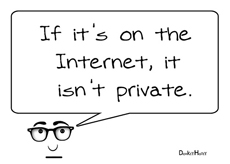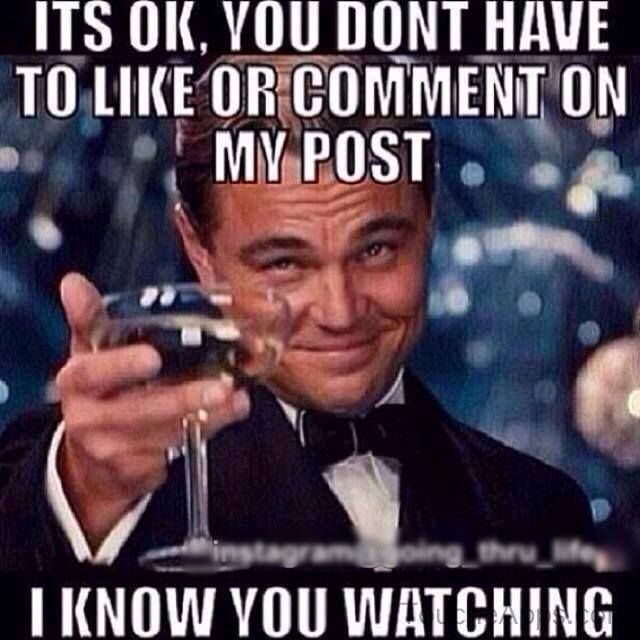To think that you have some semblance of privacy in this digital world is likely one of the biggest fallacies of our time.
Even on an extremely basic level, if you email me, I know exactly who you are, how you communicate, and when you are ignoring my messages (because whatsapp and facebook show me). I also know when you saw my email and when would probably be a good time to follow up with you (because I have a gmail plugin). I even have the ability to know how you enter my name into your phone (have you heard of noknok). And forget about how every single profile you create online likely has some privacy vulnerability or setting you didn’t do right. Snapchats are not gone forever. Whisper might not be fully anonymous. All the information is there.
Attempting to Control Our Privacy
We all go to great lengths to create a perception for how people see us, which by definition means we are hiding something. We have secrets or try to keep parts of our lives private. I know I do. But I sometimes like to tell myself that I am not really hiding anything and that I am pretty consistent with how I behave online, offline, and in the isolation of my own home with the people I love. In fact, I basically broadcast it online for everyone else to see. Because I have nothing to hide.
But that is completely false and such a messed up way to think. We all hide parts of ourselves. Human beings need and crave some privacy in various degrees. I have things that are more private than others. I have a lock on my home and a shower curtain in my bathroom. I keep a password on my email because I don’t want people snooping around there, because frankly its none of your damn business. I will talk to my mom about things that my business colleagues will likely never know.

Why Privacy Matters
If you haven’t seen it, I highly suggest watching Glenn Greenwald’s TED talk on “Why Privacy Matters“. He argues against the infamous quote by Eric Schmidt in which he said “If you have something that you don’t want anyone to know, maybe you shouldn’t be doing it in the first place.”
Glenn says:
“a society in which people can be monitored at all times is a society that breeds conformity and obedience and submission, which is why every tyrant, the most overt to the most subtle, craves that system. Conversely, even more importantly, it is a realm of privacy, the ability to go somewhere where we can think and reason and interact and speak without the judgmental eyes of others being cast upon us, in which creativity and exploration and dissent exclusively reside, and that is the reason why, when we allow a society to exist in which we’re subject to constant monitoring, we allow the essence of human freedom to be severely crippled.“
Am I Pro or Against This “Invasion of Privacy”?
I never thought I would ever have to really ask myself that question, and oddly enough I find myself struggling with it. Where are the boundaries? Are the boundaries any information unless you give permission? Is it all information as long as your name isn’t given? Is it ok as long as it keeps the world a safer place? How about a free tool vs. a paid one? Shouldn’t they be treated the same? After all, my data is my data.
I still am trying to decide how I feel about all this when it comes to modern day technology where my information is used to give a better experience. When Google uses my information, it’s not my name. I am a number with attributes that define me and those attributes are being used to enhance my experience. I have decided to trade some of this privacy for this enhanced experience. That said, I certainly don’t wan’t the government snooping in on me at their leisure (there is a tool to block that by the way). Until reports came out about Uber’s ‘god view’ mode in which they display on screen all the people using UBER in a given location, I didn’t really think much of it. Google is tracking your every move and storing that history with their location history tool as well.
When I logged in, this is what it looked like on the day of the ALYN bike ride:
And even though I am ok with Google using this information, there was an incredibly invasive feeling when I discovered this because I don’t remember ever opting into this. Maybe I did.
The bottom line is, we can all go to great lengths to conceal who we are online, but the social internet doesn’t exist that way. And it’s a problem. And to Glenn’s point, it’s not something we should accept. But by “opting in” we sort of are.
I am still trying to wrap my head around this and decide my beliefs on the subject, but here are a few thoughts I have:
- Google and Facebook are businesses but they are free for us. We use their technology for free. But that free obviously comes at a price. If you don’t like it, don’t use it. In my opinion, its that simple.
- You will argue “but then I can’t use their maps to get me from place to place” or “I won’t be able to search on the go” or “I won’t be able to keep in touch with my friends”. This is true, but that’s not their problem. This is a choice you can make to control your privacy.
- UBER is a business that I pay for and displaying actual user information is a horrendous breach of
- I know Google lets you opt out of all sorts of tracking AND delete historic data. I have heard UBER makes it extremely difficult to delete your account. You use their service and give them data to use, but its still yours and you should be able to go anywhere you want with it.
That’s my brain dump. Really curious to hear what other people think about privacy online. Let me know!
